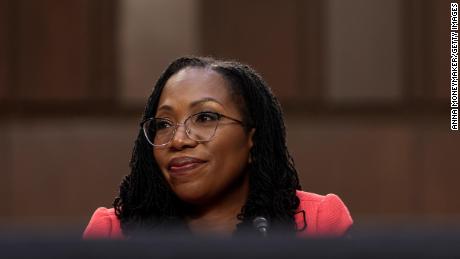King’s April 4, 1967, address at the Riverside Church in New York City proved to be more than an anti-war speech. The sermon announced King, then 38, as nothing less than an American revolutionary, one who linked the Vietnam War to structures of racism, segregation and poverty at home and colonialism, inequality and violence abroad.
What Jackson faced during her confirmation hearings reflects one part of what King described that day as “the fierce urgency of now” — referring to the pressing need for America to confront panoramic crises that threaten the health of our democratic future. The two days of questioning by the Senate Judiciary Committee unfolded along partisan political lines, and the questions themselves exposed America’s deepening racial divisions. Republican senators
attacked Jackson by distorting her substantive record, cherry-picking specific cases designed to make her look bad and attempting to drag her into hyper-partisan discussions about gender identity and critical race theory.
Democratic Sen. Cory Booker of New Jersey reminded us
what was really at stake. Expressing his determination not to let the GOP’s mendacious tactics “steal my joy,” Booker emphasized the significance that a Black woman whose parents attended racially segregated schools would soon sit on the nation’s highest court.
Viewed through the lens of what has changed — and hasn’t — since King’s words at Riverside Church, Jackson’s confirmation represents one aspect of what he that day called a “bitter, but beautiful struggle” for America’s soul that he helped to lead during the civil rights era, a battle that continues to this day.
King’s speech defined the contradictory impulses of a nation dedicated in the 1960s to building a “
Great Society” and combating poverty and racism, while simultaneously waging a destructive war — ostensibly to end communist influence in Asia but widely seen also as a colonial mission to extend American imperialism. King’s “passionate plea to my beloved nation” touched off storms of criticism from one-time supporters, liberal and conservatives, and even civil rights colleagues. Years before public opinion turned against the war, King’s words of fire evoked less the soul-searching for which he advocated and more a public repudiation of his words as anti-American.
American politics has changed, for better and worse, since King’s speech, as has our understanding of the martyred civil rights leader. The
annual King holiday, so often used by politicians who remain opposed to King’s message as a convenient opportunity to praise the symbolism of the messenger, is undergoing a
critical reevaluation in light of the political and racial reckoning of 2020. We are closer than ever, through the work of King’s daughter Bernice and the Moral Mondays Movement of Reverend William J. Barber, to uncovering the radical King who explained at Riverside, that during a moment of moral and political crisis,
silence is tantamount to betrayal.
King’s work to build a more just, inclusive and equitable society is alive in Jackson. Once confirmed, she will be the only Supreme Court Justice in American history to not only be a Black woman but to have served as a public defender. Her efforts to bring empathy and compassion to the criminal justice system are a reflection of King’s dream to build a beloved community in America, one wherein institutions recognized the humanity of Black people and underdogs from marginalized communities around the world.
Delivered one year to the day before his assassination, King’s Riverside address remains a remarkably hopeful sermon. “America, the richest and most powerful nation in the world, can well lead the way in this revolution of values,” observed King. That revolution of values meant transforming the way in which institutions and people regarded Black lives. Jackson’s position on America’s highest court reflects an important evolution in democracy as we move, however imperfectly, toward King’s dream of a new nation.
Jackson promises to be a pathbreaking associate justice on the Supreme Court who exemplifies Black women’s centrality to the hard work of democracy. The reverence in which her past colleagues,
friends and
family hold her illustrates a side of her personal and professional journey obscured by the messiness of the Senate confirmation hearings. Jackson’s dedication to family, her candor in discussing the difficulties of attaining work-life balance while sustaining a demanding career and raising two daughters and her grace in the face of withering attacks deeply rooted in the country’s still unresolved assault on Black women’s personhood and humanity show an incredible amount of fortitude that places her in a longer tradition of Black women trailblazers, including Constance Baker Motley, the first Black woman appointed to a federal bench.
The “revolution of values” that King called for transcended the Vietnam War, racial injustice and economic poverty. King asked the nation to share a new story about itself. He implored us to acknowledge our past missteps, contemporary failings and perpetual hubris. King then challenged the nation to “rededicate ourselves” to building the beloved community free of racial injustice, economic inequality, segregation, hunger and violence. He remained the world’s most eloquent advocate of non-violence. But he then urged the entire nation to follow his lead.
America has come
a long way in the 55 years since King’s speech. Some of the biggest policy victories of the civil rights era, including the Voting Rights Act, have come under threat from a new era of voter suppression. But Jackson’s confirmation attests to the heights we have reached in the over half century after King called upon the nation to embark on a dangerous mission to recover its purpose, redeem the national political soul and restore the honor of American citizenship. The crucial need to create a new world remains as urgent in our own time as it did in King’s. Jackson’s confirmation — like a rose that grows amidst the concrete — is one of those beautiful moments that King called us to at Riverside and that should be celebrated even as we remain diligently aware of the journey that lies ahead.








More News
Protesters Occupy Building at Rhode Island School of Design
A Week of Pomp to Project Putin’s Confidence
Several Tornadoes Reported As Severe Weather Batters Central and Southern U.S.